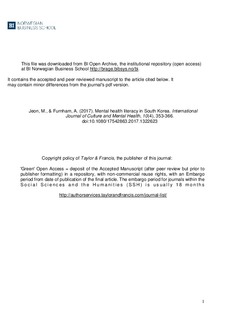Mental health literacy in South Korea
Journal article, Peer reviewed
Accepted version
Date
2017Metadata
Show full item recordCollections
- Publikasjoner fra CRIStin - BI [1015]
- Scientific articles [2173]
Original version
International Journal of Culture and Mental Health. 2017, 10 (4), 353-366. 10.1080/17542863.2017.1322623Abstract
The study aimed to examine the Korean public’s recognition of mental disorders, attitudes towards mental disorders and knowledge and beliefs about professional or self-help for mental disorders. In all 253 participants were presented with case vignettes describing bulimia nervosa, bipolar disorder, substance addiction, depression, schizophrenia, OCD, ADHD, anorexia and social phobia. Participants were asked to identify described mental disorders in the vignettes, to rate each character’s adjustment to live with the mental problems and to rate the likelihood of suggesting several types of help for each character. Participants noted their previous history of exposure to mental disorders. Substance addiction was recognized the most (80.2%) and anorexia the least (10.7%). Participants responded the psychologist/psychiatrist’s help the most helpful. Of the nine mental disorders, the recognition of six mental disorders were significantly predicted by predictors included in this study, and amongst the factors, higher level of education was found to be the most significant predictor for high recognition of mental disorders. Compared to other countries, Korean’s ability to recognize mental disorders was poorer than British and there was difference between South Korean and other Eastern countries in terms of ability to recognize mental disorders even if they share similar culture. Limitations of this study were recognized

